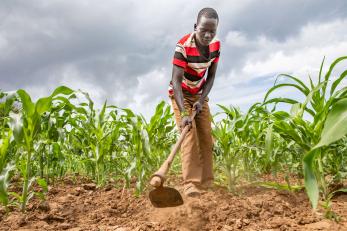Dear President Joe Biden,
The United Nations Intergovernmental Panel on Climate Change (IPCC)’s August 2021 report warned that unless immediate, rapid and large scale action is taken to reduce emissions, the average global temperature is likely to cross the 1.5-degree Celsius (2.7 degrees Fahrenheit) warming threshold within 20 years. This will result in catastrophic climate change. The deadly heat waves, mega hurricanes and weather extremes we’ve seen with greater frequency around the world will only become more severe. Climate change is already one of the most harmful drivers of worsening hunger and starvation, migration, poverty and inequality all over the world.
We are at a “make it or break it” point, and we must take action.
It is estimated that the richest one percent of the world's population is responsible for two times as much carbon pollution than the 3.1 billion people who make up the poorest half of humanity. Climate change and poverty are deeply intertwined because climate change disproportionately affects people in low-income communities and developing countries around the world. Those in poverty have a higher chance of experiencing the ill effects of climate change due to the increased exposure, vulnerability, and risks. Right now, nearly half the world’s population is estimated to be at high risk of experiencing a climate disaster, but most are not yet equipped to adapt. Left unaddressed, nearly 200 million people could require humanitarian assistance to survive due to climate-related disasters by 2050, roughly double the number of those in need due to climate shocks today.
As the world’s largest economy and second largest greenhouse gas emitter, U.S. actions can either stymie or inspire global action. Funding for adaptation and resilience programming has never been more important. And while the $5 billion recently announced by the Biden Administration to help domestic states and communities prepare for climate disasters is a step, we know even more assistance and coordinated global action will be needed to help communities around the globe adapt to the effects of climate change.
In a matter of weeks, the United Kingdom will host the 26th UN Climate Change Conference of the Parties (COP26) in Glasgow, Scotland. This will be a huge opportunity to galvanize action and renew partnerships focused on combating climate change at the highest levels of government. I urge you to ensure that the United States continues to combat climate change globally, and ask that as my representative, you take action to address these concerns and call on other governments to join and match our efforts. Specifically I hope to see the United States:
- Increase its funding for climate change adaptation and disaster risk reduction, particularly in fragile contexts and conflict affected states, bilaterally and multilaterally. The avenues we have to deploy this assistance must be efficiently and effectively used.
- Reestablish the United States’ recommitment to local solutions by working alongside local governments, communities and leaders, closest to the issues themselves, to channel resources, scale solutions, adapt to change and reinforce the loop of knowledge share and learnings.
- Emphasize that the announcement of additional funds to address climate change do not mean the reduction and reallocation of already existing streams of official development assistance, but demonstrative of the U.S. dedication and commitment to concerted and deliberate investment — which are sorely needed in addressing the climate crisis. Ensuring funding fit for the need now and issues lying ahead is crucial.
With strong U.S. leadership, we can work together to accelerate action, build resilience and integrate solutions to combat both climate change and poverty. We must take action now to assist the world’s more marginalized communities to withstand the effects of climate change.
Sincerely,

